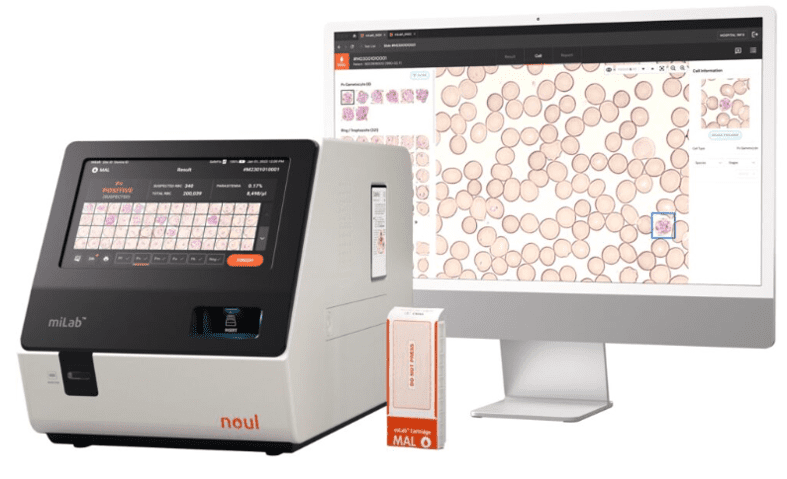A new approach to malaria diagnostics: fast, precise, sustainable
A compact diagnostic system with automated evaluation enables microscopic malaria diagnostics in just 20 minutes – resource-saving, AI-supported and ideal for flexible working hours in the laboratory.
Progress in the diagnosis of parasitic diseases
Malaria is one of the most relevant parasitic infections worldwide. Even in non-endemic regions such as Germany, the disease remains diagnostically significant – for example in travelers returning from a trip with an unclear fever. Early, reliable diagnosis is crucial for targeted treatment and prognosis.

A new technological approach to fully automated microscopic malaria diagnostics enables a differentiated and AI-supported evaluation within just 20 minutes – including pathogen detection and parasitemia determination. The system combines classic cytology with modern digital analysis methods, setting new standards in parasitological laboratory diagnostics.
Microscopy meets artificial intelligence
At the heart of the platform is an AI-supported image analysis system that automatically captures and processes stained blood samples and evaluates them for parasitic structures. The results are available quickly – with high precision and standardized quality. A manual microscopic follow-up check is possible at any time, which makes the process particularly practical.
Easy to use thanks to cartridge technology
The test is carried out using a modular cartridge system. Each cartridge can be used individually and requires no special prior knowledge. This makes the platform particularly suitable for decentralized or flexible use – for example for night, weekend or off-peak operation in the laboratory.
Sustainable diagnostics thanks to hydrogel technology
An innovative element of the platform is the use of a special hydrogel for sample processing. This reduces the volume of waste by up to 90%, lowers water consumption and saves space – a contribution to greater sustainability in medical diagnostics without compromising on performance.
Application and perspectives in the laboratory environment
As part of the gradual introduction, the platform is currently being evaluated at several locations in Germany. It is being used for the first time at MVZ Labor Ravensburg, a laboratory of the Limbach Group, where the technology for malaria diagnostics is currently in the validation phase. Other Limbach Group laboratory sites are currently preparing for integration – with the aim of bringing innovative, automated procedures to a wider audience in a targeted manner.
International cooperation for sustainable diagnostics
The technological development of the platform comes from the South Korean medical technology company NOUL Co., Ltd. (https://noul.com/en/milab/), which specializes in solutions for the diagnosis of infectious diseases. In collaboration with the Limbach Group, the technology is currently being launched on the German diagnostics market – with malaria as the initial field of application and potential for further indications.
Conclusion
Microscopic malaria diagnostics is an example of the combination of traditional laboratory medicine and digital innovation. The platform presented enables automated, AI-supported evaluation with high diagnostic quality and sustainability. Easy handling and short analysis times make the system particularly suitable for flexible application scenarios in routine operations. The initial use within the Limbach Group marks a practice-oriented step towards modern, resource-saving infection diagnostics – with prospects for further applications.
For further information on innovative malaria diagnostics, please contact us directly: infektionsdiagnostik@limbachgruppe.com




